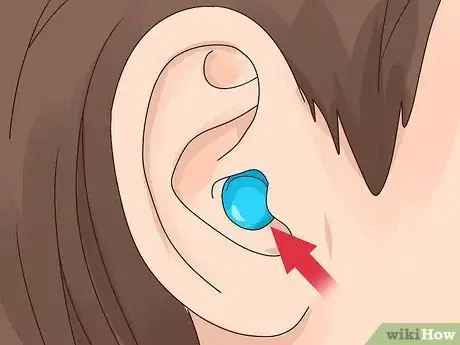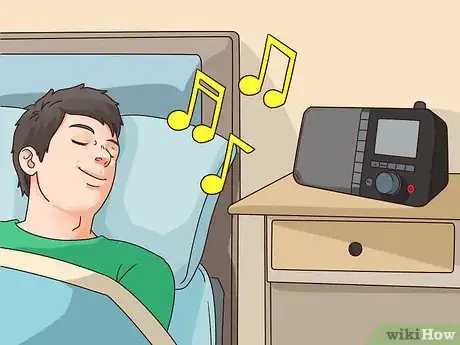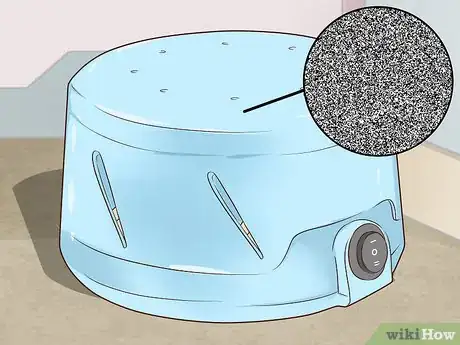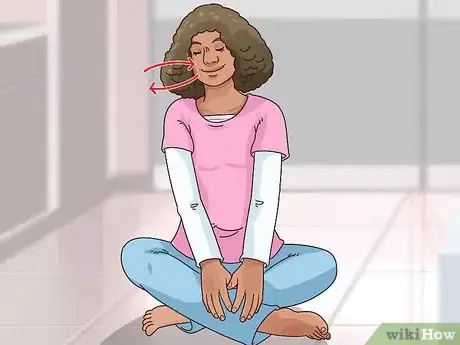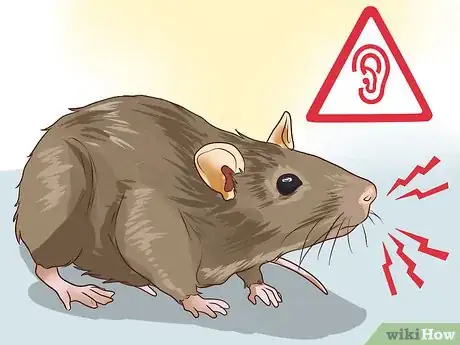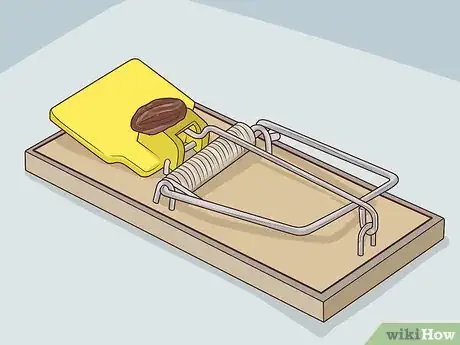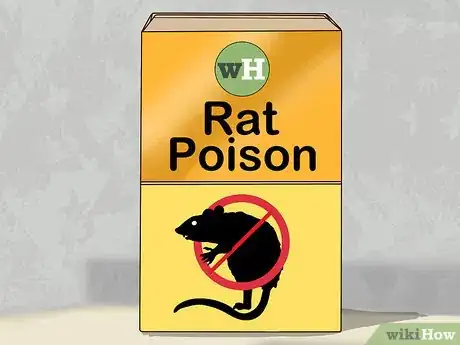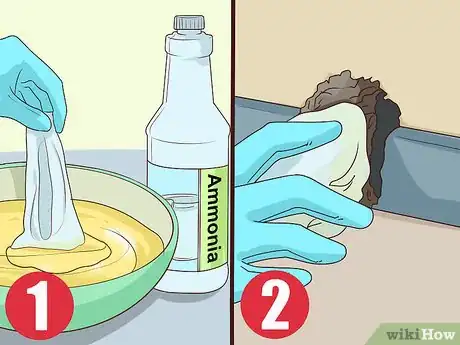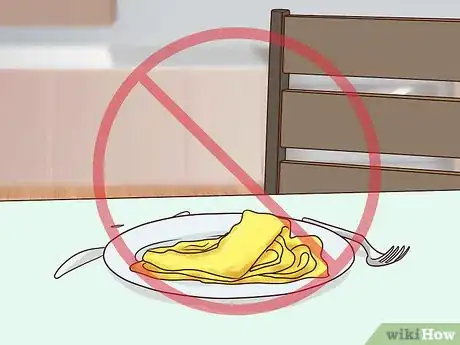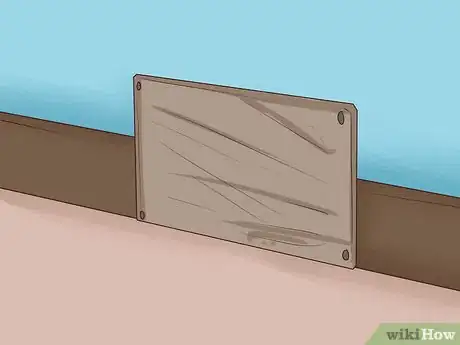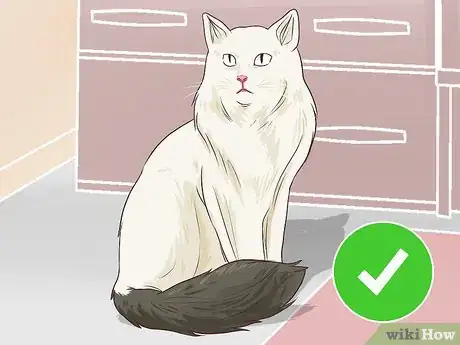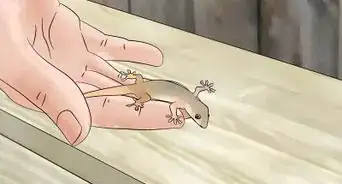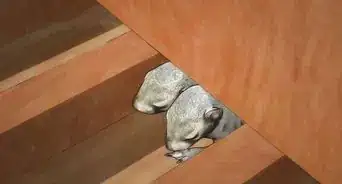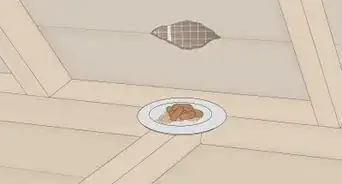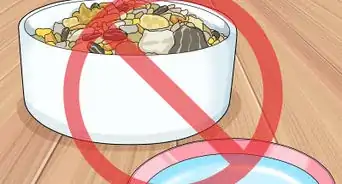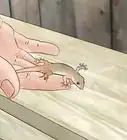This article was co-authored by wikiHow Staff. Our trained team of editors and researchers validate articles for accuracy and comprehensiveness. wikiHow's Content Management Team carefully monitors the work from our editorial staff to ensure that each article is backed by trusted research and meets our high quality standards.
This article has been viewed 89,844 times.
Learn more...
Since rats are nocturnal, you are more likely to hear them at night. This can be worrisome and disrupt your sleep. To cope with the problem, you can mask it by playing music or other sounds, by using earplugs, and by making other minor lifestyle changes. You can also take steps to eliminate the source of the rat problem by using traps, poisons, or humane deterrents.
Steps
Ignoring the Sounds Rats Make
-
1Wear ear plugs. Cushioned ear plugs are designed to comfortably reduce noise levels. Visit your local pharmacy to find some intended to wear while sleeping. Put them in at night, and you might not be able to hear the sounds of rats.
-
2Mask the noise with loud music or other audio. If you are lucky, your rat problem will be manageable, and you will only hear the occasional squeak or scratch. If you play loud, vibrant music, you will have a better chance of covering up the rodents’ sounds so you can ignore them altogether.[1]
- You can also try loud television, talk radio, or other types of audio.
Advertisement -
3Try white noise. You can purchase devices that emit what is known as white noise--a random, low-level sound that is a little like static. You can even find streaming audio channels that will play white noise continuously. White noise is thought to be soothing, and it may also help mask some of the sounds made by rats.
-
4Meditate or try breathing exercises to calm yourself. There are a variety of meditation and breathing exercises that you can try before bed or any other time at night. These are known to help reduce stress levels and improve your sleep, so they can help you cope with the sounds of rats at night. For a simple exercise:[2]
- Sit in a comfortable position, such as cross legged or on a chair.
- Focus by breathing in through your nose, holding it for a few seconds, then slowly exhaling through your mouth.
- Try to clear your mind of worries by focusing on a single visual object, repeating a short mantra (like “I am at peace”), or visualizing a place that makes you feel calm and happy.
- Do this as long as you like, but at least for a few minutes.
Dealing with the Rats
-
1Make sure it’s rats that you hear. Lots of animals can get in a house and make noise--birds, racoons, even cats. Rats will be accompanied by high-pitched squeaks. These will intensify when the rats fight. You may also hear various clawing, scratching and chewing sounds. These can be surprisingly loud, and seem like a much larger animal is making them.[3]
- You may also smell a distinctive, musky scent if rats are present. If you smell an especially foul odor, a rat may have died within the walls, roof, or flooring of your home.
- Dark, coffee-bean sized droppings are also a tell-tale sign of rats.
-
2Call for professional help. If you live in an apartment, your building manager may be required to contact a professional exterminator to deal with a rat problem. Get in touch with your management if you think you hear rats. If you are a homeowner, you can take matters into your own hands, but a professional will be more likely to deal with the problem satisfactorily.
-
3Set rat traps. This classic method for controlling rat problems can be effective as long as they are used properly. Snap traps have a spring-loaded mechanism that pins rats down when they step on it. Glue traps work by trapping rats that walk on their sticky surface.[4]
- Place several traps in places where rats are (look for their droppings). Set them in narrow places (such as behind boxes or furniture) so that rats are forced to walk on them.
- Bait the traps with food rats are likely to enjoy, such as peanut butter, raisin bread, bacon, or candy.
- If you find a rat has been trapped and killed, wrap it in newspaper or a plastic bag and throw it away. Wash your hands afterwards.
-
4Use lethal poisons to control rat populations. If you are taking on the extermination job yourself, make sure to use only approved rat poison or rodent bait, available from home supply stores. Carefully follow the usage directions and precautions advised by the manufacturer.
- Many forms of bait will come installed in pre-made, secure containers. Place these near the suspected rats. The rodents will enter the container, eat the bait, and die.
- Poisons are often not recommended for use in buildings. Rats may eat the bait, then die and decompose in a hard-to-reach space like the interior of a wall.
-
5Try humane deterrents. Though rats are undesirable and potentially dangerous, you might not want to kill them. There are a number of humane options to drive rats away. For instance:[5]
- Play loud music or other audio during the day and night.
- Shine strobe lights in areas you suspect rats to live.
- Soak cotton balls, wads of cloth, or other items in ammonia. Set them in places where you suspect rats are coming in and out (such as a hole in a wall).
Keeping Rats out of Your Home
-
1Get rid of clutter and waste. Simply reducing the access that rats have to food supplies and shelter is an excellent way to control the critters. If rats are a known or suspected problem, make sure to do things like:
- Cover all trash cans with tightly fitting, locking lids.
- Avoid leaving food or waste out in the open.
- Clean up all crumbs and other debris.
- Avoid letting things like newspapers, cardboard boxes, or clothing pile up.
- Keep grass and other plant material trimmed, and discard the trimmings.
-
2Cover all potential entryways. It’s not always easy to tell how rats are getting in your home. They can enter walls and roofs through surprisingly small and out-of the way access points. However, covering any obvious access points (like holes in a wall or roof) will at least slow them down.
- Cover access points with wood, foam sealant, or similarly solid material.
- For a thorough job, ask a professional to inspect your home and deal with any potential access points they identify.
-
3Get a cat. Though they’re not a quick fix, “mousers” can be great at controlling rodent problems. It’s true that many cats are excellent hunters, and will pounce on any rats they find, and discourage others from sticking around. You might consider getting a cat for just this reason if you are bothered by the sounds of rats. Cats are not a perfect solution, however.[6]
Community Q&A
-
QuestionShould I use rat poison if they would perhaps die in the walls?
 Community AnswerIt is worth a shot. However, rats are very smart rodents and might catch onto what you are doing. Many people have set traps only to have rats avoid them.
Community AnswerIt is worth a shot. However, rats are very smart rodents and might catch onto what you are doing. Many people have set traps only to have rats avoid them. -
QuestionI think I have a rat/ mouse in the house, but it keeps escaping my traps. What should I do to kill it or chase it away?
 Community AnswerOne of the best ways to get rid of it is to get a cat.
Community AnswerOne of the best ways to get rid of it is to get a cat. -
QuestionWhat are the signs to show that the poison is working on rats?
 Community AnswerWhen rats eat poison, it takes a little while. First, they go crazy. Then they fall asleep and die.
Community AnswerWhen rats eat poison, it takes a little while. First, they go crazy. Then they fall asleep and die.
Warnings
- Rats carry a host of diseases, so avoid handling them yourself if possible. If you must pick up a rat (live or dead), wear thick gloves and clean yourself thoroughly afterwards.⧼thumbs_response⧽
References
- ↑ http://www.peta.org/issues/wildlife/living-harmony-wildlife/house-mice/
- ↑ https://sleep.org/articles/how-to-meditate-before-bed/
- ↑ http://wdfw.wa.gov/living/rats.html
- ↑ http://www.kingcounty.gov/depts/health/environmental-health/animals/rat-prevention.aspx
- ↑ http://www.peta.org/issues/wildlife/living-harmony-wildlife/house-mice/
- ↑ http://wdfw.wa.gov/living/rats.html
- ↑ https://www.theguardian.com/lifeandstyle/2006/dec/01/homes
